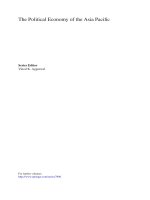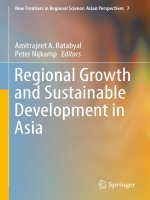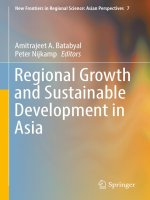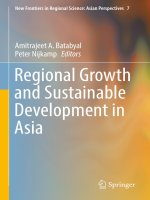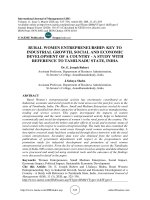Economic growth and economic development 171
Bạn đang xem bản rút gọn của tài liệu. Xem và tải ngay bản đầy đủ của tài liệu tại đây (65 KB, 1 trang )
Introduction to Modern Economic Growth
play a significant role in generating the huge income per capita differences across
countries. We will see that our analysis of the mechanics of economic growth will
often be useful in discarding or refining certain proposed fundamental causes. As to
the question of whether we can make progress, the vast economic growth literature
is evidence that progress is being made and more progress is certainly achievable. In
some sense, it is part of the objective of this book to convince you that the answer
to this question is yes.
Returning to the first question, there are innumerable fundamental causes of economic growth that various economists, historians and social scientists have proposed
over the ages. Clearly, listing them and cataloging them will be neither informative nor useful. Instead, we will classify the major candidate fundamental causes
of economic growth into four categories of hypotheses. While such a classification
undoubtedly fails to do justice to some of the nuances of the previous literature, it is
satisfactory for our purposes of bringing out the main factors affecting cross-country
income differences and economic growth. These are:
(1) The luck hypothesis.
(2) The geography hypothesis.
(3) The institutions hypothesis.
(4) The culture hypothesis.
By luck, we refer to the set of fundamental causes which explain divergent paths
of economic performance among otherwise-identical countries, either because some
small uncertainty or heterogeneity between them have led to different choices with
far-ranging consequences, or because of different selection among multiple equilibria.
By multiple equilibria, we refer to different equilibrium configurations that may be
possible for the same underlying economic environment. When our models exhibit
multiple equilibria, we are often unable to make specific predictions as to which
of these equilibria will be selected by different countries and it is possible for two
otherwise-identical countries to end up in different equilibria with quite different implications for economic growth and living standards (see below). Luck and multiple
equilibria can manifest themselves through any of the proximate causes we have discussed so far (and through some additional mechanisms that will be discussed later
157



